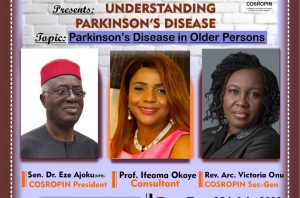
Ladies and Gentlemen, Caregivers, Advocates, Family Members, and to every heart that has a place for our beloved seniors, welcome!
My name is Dr. Ifeoma Okoye, a Radiologist also a general medical advisor , and I warmly greet you all today in our Webinar called “Decode the Neurocode: Understanding Parkinson’s disease in Elderly” today.
Thank you for being here in this digital space, demonstrating your commitment to comprehending, managing, and perhaps even combating Parkinson’s Disease – a progressive disorder primarily affecting our aging population.
Like a wrinkle on the forehead or a white hair strand, Parkinson’s Disease often creeps up with age. But unlike these visible signs, it is an unseen enemy emerging from the shadows, gradually taking away control, freedom, and often, the voice of those we deeply care about. Today, we shall step into the arena of knowledge, where understanding illuminates the shadows and fear scurries away.
So, what is Parkinson’s Disease? Named after Dr. James Parkinson, who first described ‘The Shaking Palsy’ in 1817, it is the second most common neurodegenerative disease worldwide. It prevails more commonly in people over 60, affecting both their movement and cognition. Parkinson’s primarily stems from the loss of dopamine-secreting cells in a brain region known as the substantia nigra. This dopamine deficit is responsible for the characteristic motor symptoms we associate with Parkinson’s disease – tremors, rigidity, bradykinesia, and postural instability.
However, the scope of Parkinson’s Disease stretches further beyond just motor symptoms. From the psychological burdens like depression and anxiety to the cognitive disruptions such as dementia, from sleep disturbances to issues related to bowel and bladder control, the battle we are fighting is multidimensional.
The manifestation of Parkinson’s Disease in our elderly can differ, its symptoms more profound, often masked by the generic complexities of aging, making diagnosis and management a unique challenge. It is here we encourage you to be vigilant and observant. The earlier we catch it, the better we can manage it.
In our quest to understand Parkinson’s Disease, let me assure you we are not powerless. Today, we stand tall on the advancements in medical science, with therapies like Deep Brain Stimulation for symptom control and various medication adjustments for optimum care.
In addition, we’re amid exciting times in innovative research. From neuroprotective drugs to stem cell therapy and gene therapy, many promising research avenues offer a potential lifeline when it comes to not only halting but even possible reversal of the disease’s progression.
However, as we tread these scientific paths, let us not forget that this battle isn’t fought on the global stage alone. It is equally fought in the homes of our elderly, where their simple tasks become tremendous challenges, where isolation looms large, and their daily battle with the disease takes its toll.
Let’s remember to combat this with kindness, patience, support, and most importantly, education. Arm yourselves, not with fear, but with understanding. Join support groups, share your journey, create awareness in your communities. No knowledge is small when a life is at stake, especially a life well-lived and loved.
The path to understanding Parkinson’s Disease in older adults is indeed complex, but we march nonetheless, not just as clinicians, caregivers, or patients, but as a unified front. Together, we can shed light on the enigma that is Parkinson’s, improve quality of life for our elderly, and hope, aim, and work for a future without Parkinson’s.
In conclusion, I leave you with the words of Michael J Fox, an actor, advocate, and patient of Parkinson’s Disease: “Parkinson’s is my toughest fight. No, it doesn’t hurt. It’s hard to explain. I’m trying to encase it in elegance, grace, and positivity.”
That’s our mission here today: To encase Parkinson’s in understanding, compassion, and positivity.
Thank you!





